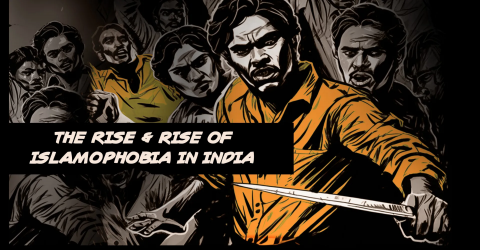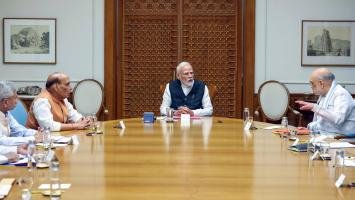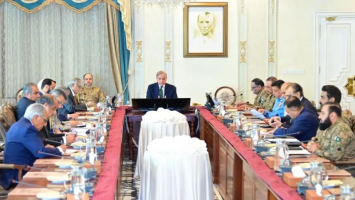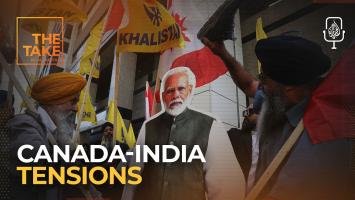Those responsible for the Pahalgam terror attack will not be spared: Modi. India's internal matter: Pakistan
Terrorists attacked tourists in Indian Kashmir on Tuesday, April 22, 2025, in the deadliest attack on civilians in several years. At least 28 people were reported killed in firing by terrorists on tourists in Indian Kashmir.
Several others were rushed to hospital with gunshot wounds after the attack in the resort town of Pahalgam in southern Kashmir.
The tourists had gone to visit the nearby Baisaran Valley, which can only be reached on foot or on horseback.
India's Prime Minister Narendra Modi, who is currently on a visit to Saudi Arabia, has directed the Union Home Ministry to take all necessary steps in response.
Police are blaming terrorists for the attack, which is being described as the biggest attack targeting civilians in the region in recent years.
According to news agency PTI, security has been tightened in India's capital Delhi after the terrorist attack in Pahalgam, Jammu and Kashmir on Tuesday, April 22, 2025.
Officials said that this step has been taken as a precaution.
Delhi Police has increased security across the city after the attack.
Strict checking and monitoring is being done especially at tourist places and city borders so that any suspicious activity can be caught immediately.
On the other hand, security personnel are searching vehicles at various places in the Kashmir Valley and extensive barricading has been done on the roads.
Pictures and videos of protests against the attack are also coming from many areas of Jammu and Kashmir. Some people in Pahalgam have also expressed anger over the candle march attack.
Opposition leader Rahul Gandhi spoke to Home Minister Amit Shah regarding the terrorist attack in Pahalgam, Jammu and Kashmir. Rahul Gandhi gave this information on his X account.
He wrote, "I spoke to Home Minister Amit Shah, Jammu and Kashmir Chief Minister Omar Abdullah and Jammu and Kashmir PCC President Tariq Hameed Karra about the terrorist attack in Pahalgam. Took full information about this attack.''
"The families of the victims should get justice and we will give them full support.''
After the terrorist attack in Pahalgam, Jammu and Kashmir, Prime Minister Modi has returned to India, cutting short his Saudi Arabia tour.
Narendra Modi left for a two-day visit to Saudi Arabia on Tuesday, April 22, 2025.
He has described the Pahalgam attack as a 'terrorist attack' and said that 'those responsible for the attack will not be spared.'
As soon as he reached Delhi, he held an emergency briefing meeting to get information about the situation.
According to news agency ANI, the situation has been discussed with National Security Advisor Ajit Doval.
Union Home Minister Amit Shah has already reached Kashmir.
After the terrorist attack in Pahalgam, Jammu and Kashmir, the Chamber and Bar Association Jammu has called for a Kashmir bandh. Their announcement has been supported by the Jammu and Kashmir National Conference and PDP chief Mehbooba Mufti.
The Jammu and Kashmir National Conference has shared information about supporting the Kashmir bandh on its X account.
The Jammu and Kashmir National Conference wrote in its post, "On the instructions of the party president, the Jammu and Kashmir National Conference has joined the collective appeal for a Kashmir bandh, strongly condemning the Pahalgam terrorist attack. We appeal to the people of Jammu and Kashmir to make the strike called by religious and social leaders a complete success."
PDP chief Mehbooba Mufti wrote, "The Chamber and Bar Association Jammu has called for a complete bandh in protest against the horrific terrorist attack on tourists. I appeal to all Kashmiris to unite to support this bandh in honour of the innocent people killed in the brutal attack in Pahalgam.''
"This attack has not happened on a few people but on all of us. We are united in grief and anger and fully support this bandh to strongly condemn the killing of innocent people.''
After the attack in Pahalgam, Jammu and Kashmir, the government of Pakistan has given its first reaction.
Pakistan said in its statement, "We are deeply saddened by the death of tourists in the attack in Anantnag district of Jammu and Kashmir illegally occupied by India. We express our condolences to the families of the deceased and wish for the speedy recovery of the injured.''
Apart from this, Pakistan's Defense Minister Khawaja Asif had spoken to a Pakistani news channel on the Pahalgam attack.
He had said that Pakistan has nothing to do with this attack. He had called it an internal matter of India.
India's Union Home Minister Amit Shah reached Srinagar, the capital of Jammu and Kashmir, to pay tribute to the dead. He also met the families of the deceased.
Also, on Wednesday, 23 April 2025, Amit Shah also reached Baisaran area, which is about five kilometers away from Pahalgam and where the terrorist attack took place.
At the same time, Congress MP KC Venugopal also reached Srinagar to pay tribute to the dead. Here he talked to journalists on the Pahalgam attack.
He said, "We have come here to pay tribute to the dead. This incident is very sad and condemnable. People of the whole country are with the victim families. We all stand firmly with our countrymen.''













